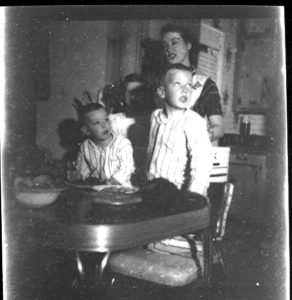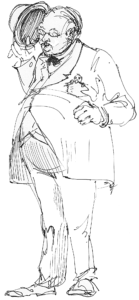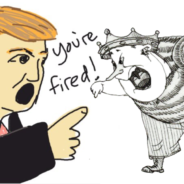More Tales of Best Friends: Religious Connections
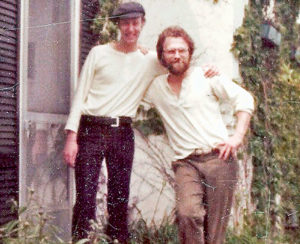
 This post is devoted to The Rev. Schuyler Rhodes who is one of my lifelong best friends and a PK. (Preacher’s kid for those secular Jewish agnostics)
This post is devoted to The Rev. Schuyler Rhodes who is one of my lifelong best friends and a PK. (Preacher’s kid for those secular Jewish agnostics)
I fancied myself a cynical Jewish agnostic during my teen years. Why not? I felt alienated and knew the only person who could relate to me was Holden Caulfield, just like every other post-modern tween in the mid 60’s.
I often ask myself why the two best friends I ever had in high school were religious. I spoke about Chip and his attempt to save me through Christ. When my friend Chip[1] moved away in tenth grade, I became friends with a very cool guy, whose dad was a Methodist minister, Schuyler Rhodes. In those days Schuyler went by the nick-name Skip. He was good looking and always had the girls swooning. Of the two of us, I was the funny geeky guy, the proverbial sidekick to his charming, unassuming swagger. I have to say, for whatever reason, his good looks, swagger and intellect in no way made him insufferable. (Probably because at heart he was more like me than he appeared. I couldn’t understand why until much later)
We became friends in eleventh grade and he and I loved to fence, intellectually. I hung out at his house which was another version of a Norman Rockwell vision of suburban America. His mom was a doting mother with a dry humor and his father was the Reverend James Rhodes, a poet and larger-than-life Orson Welles-ian figure who loved to tell jokes and trade jokes with me. He had sisters, but was the only son in a very patriarchal home.
We hung out with some friends of his from MYF, the Methodist Youth Fellowship and I met another friend Jim Marks. For a while we were a triumvirate. My specialty was making them laugh and together we did all the things that kids our age did; we tried getting drunk on Southern Comfort, listened to Monty Python, tried pot, and spent nights at each other’s house. That is to say, I spent time at theirs since my house was too toxic.
Although I hung with the Methodists, I was not influenced to become one. It was more or less, that’s who my friends were. I did have to sit at the dinner table at the Rhodes’ and hold hands during the doxology. I suppose, part of why I was so accepted is Christian charity, but more I think, I was somehow aligned with a spiritual quest. I was not going to follow any one doctrine because of my skeptical nature, but I was drawn to friends who were.
Schulyer and I were, for a time great, roommates and we called ourselves “Suburban Heroes” thinking we were going to settle into a nice life as part of the great American dream, but our natures led us to break from that mold and seek higher ground. He, in religious life as a community builder, and me for the glamor of a show biz career, and the gospel according to Spolin.
Schuyler today is in charge of a region of Methodist churches having spent his career as a socially conscious Methodist minister and our friendship has stood the test of time. As a matter of fact, it was Schuyler’s dabbling in college theater that led me to meet the greatest influence of my life, Viola Spolin[2].
My first friend Chip, dropped out of art school to become an evangelical preacher and eventually had a church somewhere, before leaving the ministry to lead a civilian life.
The next friend I had, I found through my performing life. Caleb Chung my long-time comedy partner and friend was involved in a new Islamic based religion called Subud. More on that in my next post.
God bless.
Gary
[1] (I spoke about him in my last post – https://gary-schwartz.com/friends-are-my-salvation/)
I’m Good Enough, I’m Smart Enough and Doggone It… Stuart Smalley is Funny!
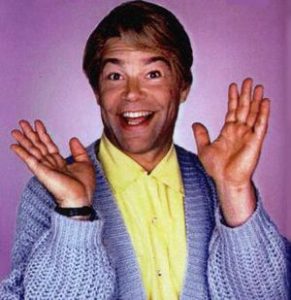 Al Franken struck a nerve and made Stuart Smalley’s quotable catch phrases all the rage on Saturday Night Live in the 1990’s. Remember these?
Al Franken struck a nerve and made Stuart Smalley’s quotable catch phrases all the rage on Saturday Night Live in the 1990’s. Remember these?
- I’m good enough, I’m smart enough, and doggone it, people like me.”
- “That’s just stinkin’ thinkin!”
- “You’re should-ing all over yourself.”
- “I know I’m not perfect…and that’s…okay.”
- “You’re only as sick as your secrets.”
- “Compare and despair.”
- “You need a checkup from the neckup.”
- “It’s easier to put on slippers than to carpet the whole world.”
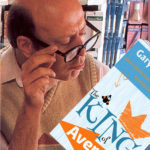 My first published middle grade novel, The King of Average is an adventure story about a boy struggling with the unnamed fear that he’s not good enough, smart enough to be anything but mediocre and that’s… okay! It’s more than okay – It’s all he believes he can aspire to.
My first published middle grade novel, The King of Average is an adventure story about a boy struggling with the unnamed fear that he’s not good enough, smart enough to be anything but mediocre and that’s… okay! It’s more than okay – It’s all he believes he can aspire to.
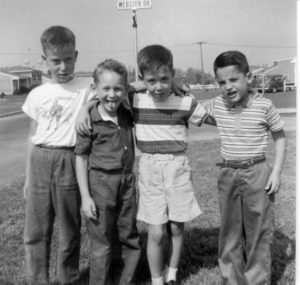 That was me at age eleven. Decades before Al Franken came up with Stuart Smalley and gently poked fun at the type of healing therapy and self-help affirmations that became popular as the “Me Generation” tried healing their inner child, I was working on affirming my ‘averageness’ to forestall the belief I was not as bad as I felt.
That was me at age eleven. Decades before Al Franken came up with Stuart Smalley and gently poked fun at the type of healing therapy and self-help affirmations that became popular as the “Me Generation” tried healing their inner child, I was working on affirming my ‘averageness’ to forestall the belief I was not as bad as I felt.
My favorite part of Smalley’s therapy involved a guided visualization of a walk through the Dysfunctional Forrest – a dark and scary place. “Let’s see who’s here. Uh- oh. Look! There’s Rage-aholic Rabbit! Let’s meet Grandiose Bear, Overcommitted Opossum, Sex-aholic Squirrel, and a beautiful little child…a child who looks a lot like you…”
Franken’s satire was inspired by his experiences in Al-Anon and is more a comment on those who talk the talk without walking the walk because, let me tell you, it’s a real odyssey to heal that child and re-parent yourself so you can honestly love who you are.
All kidding aside, being a walking, talking wounded adult child takes its toll. I also think there are millions of kids who’ve suffered this type of love deprivation and worse what with all the single parent families and broken homes in the world. We find so many ways to fill that void: drugs, sex, rages, depression, obsession and phoniness. It’s a real problem and a barrier to living a fulfilled, happy life.
I hope my book inspires kids to think about this after reading a fun adventure story. And then later, when they identify the source of their unhappiness, they can undertake a similar journey in all seriousness, and endure that inevitable pain of healing buffered by a good sense of humor.
The Self-Doubt Monologues (dialogue)
It’s time. You’re up next. It’s either a speech, or at bat, or an oral exam and you have to perform. Scary, huh?
I’m reprinting a blog from another site. http://www.improv-odyssey.com/?p=2497 to because it reminded me of a passage from my book, The King of Average, where our little boy must be examined by the council to see if he’s suited to replace the former King of Average.
Doubting oneself is normal. How we overcome doubt or handle it reveals who we are. I learned a great many lessons from my teacher Viola Spolin, but the most valuable is that the unknown is exciting and not knowing is fuel for the adventure, if given the right context.
Not knowing in other contexts produces anxiety and fear, the key is to free yourself from the ghostly voices of judgmental parents, teachers, and internalized versions of same and do it because it’s fun to try!
The Scene: Improv Class with the legendary Viola Spolin.
“Alright.” she says. “Who wants to go next?”
I hesitate.
The ‘What if…?’ dialogue:
“What if I can’t do it?” That’s where it starts for me. I get afraid.
“Afraid of what?”
“Not being able to do it? Then people will laugh at me?”
“Hey! I’m in an Improv class, isn’t that what I want?” the voice in my head is having a discussion with another voice in my head.
“You want them to laugh at your jokes, not be the joke.” The debate in my mind continues.
“No, I want to be as good as everyone else. Better!”
“Don’t go first.” I tell myself. “Let’s see what somebody else does.”
“Why? So I can be like them? That’s not good.” I counter. “I’m never going to find out what I can do copying someone else.” The Angel on one shoulder is arguing with the Devil on my other shoulder.
“But what if I can’t do it? I’ll be humiliated. Found out.”
“Found out what?”
“That I can’t do it.” I whine.
“So what?” I argue.
“Let me just watch.” I tell myself. “I need to see how they do it.”
I watch. I see that it’s not so hard. Or I see that it is hard. No one is getting it. if it is hard I watch to see how they fail and make sure I don’t do that. I let everyone else take the heat.
“Coward!” Another voice in my head shouts.
“I knew you couldn’t do it. Who are you kidding?” yet another voice chimes in. “Don’t bother, it’s not worth it.” “Give up before you make a fool of yourself.” Now it’s not just the Angel and the Devil – it’s my whole family!
Viola called this ‘Ghostly Voices’. It’s a form of being in your head. I knew all that. I’d read the book. But this is what kept me from moving forward in Viola’s Improv class. Risking failure; fear of the consequences – Humiliation. That was the state I constantly found myself in that first year. It was my conditioning.
We all have fear. We are conditioned to respond to it. From the time you do something wrong as a child you are scolded by your parents. It’s awful to incur the displeasure of your teacher, preist, nun or rabbi, or whatever authority figure you can name. They influenced you when you didn’t do what they wanted you to do. We are conditioned practically from birth to conform to other’s expectations. And the only way to breakthrough that conditioning is to risk it. Discover that you can survive it. Or is it?
I read the book “Feel the Fear and Do It Anyway.” Much is written on the subject and there’s a lot of advice on how to counteract fear. Be happy to Fail! Fail and Fail often! Risk it! Take a chance! Be brave. Seeking the reward of overcoming fear is indeed a great feeling. We feel accomplished and exhilarated when we overcome fear.
When I was in Viola’s class, for the first year that was my focus entirely – OVERCOMING FEAR.
“It’s your ghostly voices! You’re in your head. Stop it!” she would holler. “The focus of the game is… and she’d state the focus and the rules. During the game she’d coach. “See your fellow player!” or “Use your where. Let the where support you!” or “More! More! Heighten what’s going on!” or “No urgency! We have all the time in the world.” never once saying a judgmental thing. (I was already doing that on my own thank you).
After playing she would ask “Were you able to accomplish the focus?”
“Class, did he (they) accomplish the focus?”
“No.” they would often say.
“No you didn’t. Alright. Next!”
Sometimes I’d defend myself. “I was trying to get…”
“I DON’T CARE!” She would holler. “There’s always a reason. Next!”
Sometimes if the answer was “Yes I did achieve the focus.” I would feel fantastic.
After a successful game, Viola would ask “Did he (they) benefit from the evaluation of the first team? Yes or no?”
“Yes.” they would say.
“Yes. You did achieve the focus. Alright, next!”
I never heard Viola once say, “That was good” or “you were wonderful.” “Nice work.” She also never said “That was terrible!” “Awful.” Or any other judgmental comment. Sometimes though she would yell at me “What we’re you DOING!?” and I’d feel embarrassed and try to explain what I was trying to do. “Never mind, there’s always a reason.” She would preempt. And then it was on to the next game.
I always felt terrible if I didn’t succeed. During evaluation sometimes I just couldn’t answer. I would shrug. Oh, it was excruciating at times. Other times if I had done it, I would feel great. But that was me. It was not what Viola was interested in. Viola was not interested in me, per se. She was after the game and getting me to play.
COUNTERACTING FEAR
You counteract fear by not judging, just noticing without comment.
It took a while to feel the effect of not being judged. I was constantly judging myself. Viola let me have my own fear and never addressed it directly. She was canny.
My fear showed up as urgency, timidity and often imitation as I tried to do it the way I thought she wanted. Or the way another team or player would do it.
Once I accepted that whatever I did either worked or it didn’t and stopped trying to defend myself, I began to have fun. Every game was a gas. Whether I could do it or not was no longer the issue. I just started focusing on the focus of the game rather than my fear. This only happened because Viola would scrupulously avoid any judgmental words, good or bad as we played. Eventually I got used to hearing “did he do it or was he in his head?” When I stopped feeling bad about being in my head I accepted that it was just what was going on at the time and that allowed me to stay out of my head. I stopped judging myself.
Soon the ghostly voices stopped. They were replaced with great anticipation. I focused on the game rather than on myself. Call it ego, The Approval/Disapproval Syndrome, Fear of Failure or whatever else you like, It’s what stopped me from playing. My focus was always fear and trying to overcome it. When it was not addressed in class, in time, my fear simply dissolved. Class was not about Success and Failure it was about objectivity verses subjectivity.
It was all about fun and celebration. That’s when I discovered true Improvisation.
“Those who are raised in fear are themselves slaves to that passion.” – Bertrand Russell (I think) or it could have been Krishnamurti. Anyhow that’s the point.
Overcoming Self-Pity through Immersive Action
How Viola Spolin Helped Me Overcome Self-Pity
“Poor me. Nobody loves me.” Underneath my cheerful façade, underneath my very well developed sense of humor, I walked around Hollywood with that deeply embedded in my soul. I was working as a bartender, ministering to and medicating others’ pain with banter and booze while chasing the dream of being an actor in LA along with thousands of others.
My story is typical: I was the product of a childhood filled with family dysfunction – family chaos: Parents who did their best, but were totally unequipped to bring up a child with love and kindness. Instead, they were angry, spiteful and self-involved children themselves, who had created a family before they knew what they were doing. They resented the fact that they were now saddled with children and responsibility. They raised me and my brother and sisters with anger and resentment. How could they not? My childhood sucked. They loved me in their own way I guess, but as a child, I couldn’t see it. Poor me.
As I grew up, I wanted to be an actor. I wanted to get out of my own life and into another, more interesting life. I wanted to be someone else and be rewarded for it with fame and love. That was my goal. A misguided motive for the theater, but there you have it.
When I arrived in Hollywood, I took acting classes and improv workshops – the usual regimen beginners do when starting out. I was a terrible actor. I was amateur and awkward and had no clue what the art of acting was really all about. Still, I was determined to make myself an Actor– capital “A”.
Things changed when I found myself in Viola Spolin’s ongoing Wednesday afternoon theater games workshop. (See the article: How I met Viola Spolin)
We went through many hours of different kinds of games and exercises in that first year. I did my best, but felt frustrated by much of it. I looked at the others in the workshop who seemed to do good work and envied their talent. They are really good actors, I thought. I am not.
“You’re trying to act,” Viola said to me. “You’re acting your head off! Don’t you see that? – It’s not about acting out or imitating. It’s about YOU being there! YOU! Not some idea of how you should be. That’s in your head!”
Intellectually, I knew what she was talking about, but had no clue how to avoid it. I reflexively had to ‘act’. I was in my head. I was not about to analyze my underlying problems (of which I was hardly aware anyway). Nor was Viola. She would often say, “This is not psycho-drama. I’m not interested in your personal emotions. I want to see the emotions and actions of the scene. Don’t work out your personal problems on my stage.”
No, my personal problems were my own cross to bear. I was busy covering up my feelings of inadequacy with humor and charm. (I’m sure I was not alone in this. If this rings a bell with you, dear reader, read on.) I thought, “That’s what you do in improv – use wit, humor and charm. Try to act like those others you see and admire.” Fake it, in other words.
We met once a week at the Cast Theater on El Centro Street near Melrose. It was a small 99-seat theater a few blocks away from Paramount studios. Ah, Paramount – it seemed to me a monolithic ivory tower of success that I would never penetrate, acting-wise. Maybe I could get a job there in the cafeteria or something. Poor me.
Week after week Viola witnessed my struggle to do good work in her class. Sometimes she would yell at me “What am I going to do with you?” I was tempted to ask ‘what should I do, then?’ But I knew better. You never asked “how to” in Viola Spolin’s workshop. Viola was all about you figuring it out. If you asked ‘how do you want me to do it?’ she would blow up at you. “I DON’T KNOW! I’m not the answer book!” she would shout. No, with Viola, it was all about getting out of your head and into the body, into the space and making these discoveries on your own. All she would do is point out when you weren’t doing it and when you were in your head. I did scene after scene, exercise after exercise but could not understand what was in my way. If Viola knew, she wasn’t telling me.
I’d leave class some days so frustrated. I can’t act. Who am I kidding?
Over the year, Viola and I had become friends. (See “How I met Viola Spolin”) and I usually sat next to her while she coached. She could get such incredible scenes out of so many of us. My work was still pedestrian – nothing special, nothing to write home about, but I was there, man. –
We did an exercise called Intensify Emotion, a game where the sidecoach, in this case Viola, watches a scene between two players and calls on them to heighten and intensify the emotions that emerge for each player out of the playing. If one actor is feeling happy and the other is doubtful, she would coach each respectively to heighten that feeling. Viola would call out to the players, “More Happy!” “More! Even more happiness!” “ Feel happy in your chest!” – (to the other actor) “More doubt!” “More!” “Put the doubt in your face! In your fingers!” “More! – Heighten it!”
What began to happen to the players onstage was amazing, funny, exciting and wonderful. Happy turned to joy. Heightening joy became hysteria, hysteria morphed into giddiness and so on. Doubt turned to concern, to worry, to panic, to fear, to terror, etc. Intensifying Emotions created transformation. It was absolutely astounding to see such emotional energy move the players in such surprising ways. Great theater.
Now it was my turn. I was paired with a very attractive, sweet woman namedSusan. We chose a scene (who, what and where) that had a good emotional starting point. A scene we knew had built-in emotional potential for both of us. We were in a prison meeting room, separated by a glass window, with phones on either side. I was the prisoner andSusanwas my wife coming to break the news that she had fallen in love with someone else. Oh, this was juicy.
The scene began:
Me: Hi honey. (with love) Gee, I missed you.
Susan: (tentative) Hi Gary.
Viola: (to me) Heighten glad to see her!
Me: (sensing something wrong) What is it, darling?
Susan: (eyes downcast) I… I…
Viola: (toSusan) Heighten that feeling! Put it in your shoulders!
Susan: (Crying)
Me: What’s wrong?
Viola: Concern! Heighten concern!
Me: What is it, honey? What’s happened? (deeply concerned)
Susan: I’m in love (still crying) with someone else. I don’t love you any more.
Me: What?? (I have a look on my face of bewilderment and shock. I get a sinking feeling in my stomach.)
Susan: I’m so sorry, honey. I’m so, so sorry. It just happened. I’ve been seeing him for months now… We fell in love.
Me: (crestfallen) Oh.
Viola: (to me) Heighten that feeling! Put it in your stomach, throat, face!
Me: I see… (Completely numb, shocked, sad)
Now I almost stop hearingSusanand what she is saying. All I begin to hear is Viola’s coaching to me.
Viola: (to me) Intensify it! Put it in your chest!
My shoulders slump. I look down at my feet. I bow my head. I think to myself, ‘No one loves me. Poor me.’
Me: Of course, this is what I get, what I deserve. Shit, why does it always have to be me?’
Viola: More! MORE!
I begin to feel sick to my stomach. “Poor me” is coursing through my whole body. I can’t even look atSusanwho, I imagine, Viola must be coaching too, but I am too involved now with my own pity to notice.
Viola: More! EVEN MORE! Put it in your nose! Your eyes, your legs!
INTENSIFY IT!
I am covered in self-pity.
Viola: Heighten the self-pity! Poor me! Say it in your feet! Put it in your spine! C’mon, even more! Heighten it!
I am revulsed by self-loathing. I begin to feel exposed. Naked. The whole class is watching this. Seeing me – the real me. I am no longer playing a prisoner in a cell talking to his wife. I’m me and I’m the only one who feels sorry for myself in the whole wide world. I am so sorry for myself I could puke – literally.
I feel so ashamed. Everyone is seeing me like this. My true self – Oh, god, I am so ashamed. I can’t stay here. What am I doing here? I can’t act. Now everyone knows it. I slowly get up. I don’t look up; my eyes are glued to the floor.
The cell window is gone. The phone is gone. The scene has dissolved. I am not in the scene anymore.Susan, I think, is still in the scene playing my wife, I don’t know. Maybe she’s just gawking at me like everyone else.
I have to get out of here. I begin to walk across the stage floor, slowly, deliberately. If I run I am a coward, but if I walk I might be able take the last shred of dignity I possess with me. “Don’t work out your personal problems out on my stage!” Viola’s words echo in my head. I make it to the door. I walk out.
Viola: COME BACK! Come back!
I open the door into the bright, sunny afternoon. It is such a contrast to the dark little theater space, but it is a dull, lifeless bright. The sun cannot penetrate my despair. I get in my car and drive home. I have no thought; I just drive like a zombie. I get home. I lie on my bed. I am a husk; dried up, empty. I have no feeling anymore – maybe a little residual of shame, but it’s hardly worth mentioning.
Time passes, I couldn’t say how long, but it was the same day.
The phone rings. It is Viola.
Me: Hello.
Viola: Gary! What were doing!?
Me: Viola, I had to leave. I couldn’t stay.
Viola: Oh, honey. If you had only stayed…if you had only stayed—I’d have cleaned you out of it!
Me: (listless) Yeah.
I hang up. I lie back on my bed. Soon, I begin to feel unexpectedly better. I put my hands behind my head, look up at the ceiling. I am pensive.
Lying there on the bed, I feel my body, my feet, my legs, stomach and hands. They feel good. They feel new.
I have the distinct image that if I were being filmed, the camera would be above me on a crane, slowly pulling back ever further to see me; me on the bed; me on the bed in the room; me on the bed in the room in the apartment; in the apartment in the building; in the city – in the world.
I feel good. I inspect my emotional self, still lying there on the bed. I feel pretty good. No self-pity; No shame; No embarrassment, even.
Hey! I feel pretty damn good! In fact, I feel terrific. What is going on?
I’m hungry. I get up and go out.
I am going out to get something to eat. I’m alive and I am hungry. I am an actor inHollywoodgoing out to get something to eat, because I’m famished. I’ve got a career to go after. Hey, life is good!
Epilogue
Ever since that day I have never ever felt sorry for myself. Viola’s coaching and the game itself banished that unproductive emotion from my psyche forever.
Self-pity, many acting teachers will tell you, is the poorest choice you can make for a character. It is an unpleasant emotion to witness, an excuse for the self to stay hidden, a paralyzing emotion. Self-pity keeps you from having any contact with the outside world and useless in real drama. Useless in life.
Soon afterward I began connecting with my acting; going on auditions and getting callbacks and some acting jobs. I still had a lot of other emotional problems (who doesn’t?) but self-pity was not among them.
Postscript: Viola did not intend her work to be psycho-drama. She used to say “Never use your own tears! Use the character’s tears!”
That her work did help me out psychologically was only a side-benefit of her connecting me with my real talent and the beauty and profundity of her philosophy. Yet her work, at a deep level cannot help but be transformative.
Inescapable Donald Trump Parallels in my Book The King of Average
I hate to say it, and am not truly comfortable making a parallel between the Republican front-runner Donald Trump and a character in my novel, The King of Average, but after hearing Trump boast his awesome prowess as the leader of the most powerful country on earth, I can’t stand by without comment.
Ironically, I realize this is shameless promotion (something Trump would heartily approve), but the lesson voters could learn from chapter 14 of my book might be worth it.
 So here, without any further comment, is a preview of my book The King of Average, a children’s novel that entertains while helping children understand issues with self-esteem.
So here, without any further comment, is a preview of my book The King of Average, a children’s novel that entertains while helping children understand issues with self-esteem.
Chapter 14: The Ninnies and Their Fabulous King
With a barely visible path before them, James and company pressed on as the sky turned to blue, then purple. Night was upon them.
“It’s no use. We’re wandering around like a bunch of ninnies,” groused Kiljoy.
“Ho, there! Did someone say Ninnies?” A voice came across the field.
James and Roget turned to see a small tribe of little men very much like the Nervous Nellies. They even wore similar loincloths but their skin was pale lavender, their loincloths blue. James counted a dozen. The tiny pale men advanced toward them, marching two abreast. Their movements were slow and methodical. They wore dull expressions on their faces; mouths slack-jawed, their eyes round and vacant. They stared in awe, stupefied at everything around them.
Kiljoy emerged from Roget’s pocket. “They don’t look too bright, do they?”
A second phalanx brought up the rear, carrying a sedan chair painted blue with gold stars haphazardly emblazoned on the sides. Inside was a man wearing a white cape trimmed with gold braid. He wore a very intricately woven straw cowboy hat with red trim around the brim and a peacock feather poking out of it. He was the same size as the other men but didn’t share their dull expression. On the contrary: he was lordly, smiling and alert.
He hopped out and strutted up to James, Culpa, and Roget. Looking them up and down, he declared, “You’re not Ninnies.”
“No, we’re not,” said James.
“I heard someone say you were! I’m sure of it.” The man scrutinized them suspiciously. “Are you sure you’re not Ninnies?”
Kiljoy had enough. “Of course we’re not ninnies, you Ninny!”
“No offense. It is a manner of speech,” said Roget. “Forgive ’im.”
“Because if you were ninnies, I’d be your master and you would be sworn to obey me, for I am King of the Ninnies.” He drew himself up to his full height (which came to James’s knee). “Right, everybody?” he called.
“RIGHT!” they called back.
“I am Alastair the Vainglorious!” he announced resoundingly.
The crowd cheered as if on cue. “All hail the king!” They began a monotonous chant, “All hail the king! All hail the king! All hail the king! All hail—”
“That’s quite enough!” Alistair cut them off with a gesture. Obediently, they stopped mid-chant.
“Don’t mind them. They’re Ninnies,” he said.
“Ah, another king! Merveilleux!” said Roget. “My friend James ’ere is soon to be a king ’imself.”
“Is that so?” said Alistair with a cocked eyebrow.
“Oui!” said Roget.
“Oui. Er, yes,” said James, “I am. My name is James and this is Mayor Culpa and Monsieur Roget and that’s Kiljoy.” He indicated toward the squirming bulge in the optimist’s pocket.
“You’re not my enemies, are you?” said Alistair warily. “Because I’ve led my army of Ninnies to victory in every major war against great odds and you wouldn’t stand a chance!” He tilted his chin into the air.
“We’re not your enemies,” said James. “I’m on a quest to become King of Average.”
“King of Average, eh?” said Alistair, stroking his chin, satisfied. He put his hands on his hips and puffed out his chest and boasted, “That’s nothing. Me? I’m sovereign ruler of every territory there is around here except for Average.” King Alistair turned to his followers. “Isn’t that right?”
“Whatever you say!” the Ninnies rejoined.
“See that?” he said gallantly, placing his fists on his waist.
Kiljoy popped up to glare at the little man. “You? A general, a fighter, and the king of everywhere else? I find that hard to believe.”
Alistair’s smile dropped. His eyebrows knotted with worry and his lip quivered.
“It’s true, I’m the greatest king ever!” he said. “I’ve done practically anything you can think of! Look! I even made this hat!”
He showed them his hat, which to James was obviously machine made and store bought.
“I made it all by myself. And . . . and I spun this cloth to make this cape. You name it and I’ve probably done it! Isn’t that right, my Ninnies?”
The Ninnies all reassured Kiljoy that King Alistair was the nicest, bravest, most resourceful king they’d ever known and that he was greatest king who had ever lived.
Kiljoy responded, “What do they know? They’re Ninnies!”
Alistair frowned and bit his lip. “It’s all true . . . every word.”
“It’s all right. You don’t have to make things up to impress us,” said James.
“I don’t? Er, I mean, I don’t! I’m not!” the king said. “But, be honest. You’d like me a lot more if I was the greatest king who had ever lived, right?”
“Not really,” said James.
“What? You mean, you’d like me even if,”—he lowered his voice to barely a whisper—“if I wasn’t a king?”
“Sure,” said James.
Alistair was astonished. “Why?!”
“I’d like you just because.”
“Just because?” Alistair thought for a moment. “Impossible! Nobody likes anybody just because. You have to impress everyone and make them think you do great things! Things to be admired! ‘Just because’?!” he scoffed. “That’s ridiculous.”
“No, it’s not,” James insisted.
“Shhh!” said King Alistair. “Don’t tell my Ninnies,” he pleaded. “If they found out I—er, ah wasn’t . . . that I didn’t . . . and I couldn’t . . . they’d hate me. Or worse! They wouldn’t let me be their king anymore. Promise you won’t say anything!” The little man was frantic. “I’ll give you anything, ANYTHING! Only please, please say you won’t tell! Please, don’t tell!”
This poor man, thought James.
Kiljoy popped up. “I for one would like you better if you got us out of here and told us where we can find the old King of Average. I want to get this ridiculous quest over with.”
Alistair’s eyes lit up. “Done!” He clapped his hands. “Ninnies! My chair! Prepare to march on the double!”
The Ninnies sprang into action. They brought out another litter and scooped James, Culpa, and Roget into it in front of Alistair’s sedan chair and marched through the night, huffing and puffing. The rhythmic swaying of the chair on the shoulders of the Ninnies lulled them to sleep. At dawn, Alistair and the Ninnies deposited the group back on the middle-of-the-road, refreshed and ready for the day.
“Follow the road south to an old resort called Disappointment Bay.”
“Do you know for sure he’s there?” asked James.
“He has to be there,” Alistair predicted. “It’s the last resort.” He grabbed hold of James’s shirt and pulled him down and whispered, “Remember—you promised!” Alistair hopped onto his chair and called, “Ninnies! Away!”
Alistair the Vainglorious, King of the Ninnies, waved good-bye, looking every tiny inch a departing hero.
Helping Find the Positive in a Less-Than-Ideal Childhood
According to various studies* low self-esteem in children tends to be related to either physical punishment and/or withholding of love and affection by parents and only receive positive attention from authority figures (such as parents) when they act in a certain way. This reinforces to the child that they are only a person of value when they act a certain way (e.g. achieving A grades on a test).
Children with low self-esteem rely on coping strategies that are counterproductive such as bullying, quitting, cheating, avoiding etc.
Children with low self-esteem are often withdrawn or shy, and find it difficult to have fun. They avoid trying new things (for fear of failure) and will give up easily.
* McLeod, S. A. (2012). Low Self Esteem. Retrieved from simplypsychology.org
My new book The King of Average addresses issues that many children face if they come from a background of chronic unfair punishment or parents who withhold affection (for whatever reasons) or parents with unreasonably high expectations and conditional love. To some degree that’s all of
us at one time or another. And that’s why The King of Average will resonate with children and adults.
 What James, our young hero aspires to, without knowing it is the presence of a benevolent, powerful father.
What James, our young hero aspires to, without knowing it is the presence of a benevolent, powerful father.
Without ever knowing a father, his ultimate fantasy authority figure is a King.
He is armed with the childhood graces of optimism, in the form of M. Roget, the French optimist and his sour companion Kiljoy the pessimist. He is also excused from guilt by a talking goat named Mayor Culpa whose job it is to shoulder the blame he would normally place on himself. 
These elements allow James to journey into the Realm of Possibility to discover his true nature and escape his negative conditioning personified by a cruel and malevolent shadow-self.
That being said, the main thrust of the story is one of humor and friendship because that was the path I took as a boy to escape the oppression of my childhood love deficits.
Why I Ran Away and Joined the Invisible Circus
Schenectady New York, 1964
It was a real chore, going to Hebrew school after ‘regular school’, trying to learn just enough Hebrew to get by on the “Big Day” – the day we would become ‘men’. On this particular day, I was hanging out in the parking lot of Temple Beth Israel Hebrew School on Eastern Parkway, with a few fellow bar mitzvahs-in-training.
We played stoop ball to pass the time while waiting for our respective rides home. Stoop ball is abbreviated baseball without a diamond. The rubber ball is thrown against the corner of a cement step and bounced into the field. i.e., parking lot. A catch is an out; A low bounce a single; over our head (high enough not to be caught but within the parking lot) a triple. If you could get it out into Eastern Parkway that was a home run.
Across the street from us was St. Helen’s Catholic school; a serious red brick building two stories high and built in the early part of the century it’s ornate architecture reflecting the traditions of the church. Our building was one story, pale beige brick and glass and relatively new, reflecting the practical modernity of the 1950’s.
I always wondered what it was like to be Catholic. Our Hebrew teachers were old world Jews from Eastern Europe who, only a decade earlier, escaped the horrors of the death camps. They did their best to instill in us our good fortune and promoted the idea that we were the chosen people and the ‘Goyim’ (non-Jews) were followers of a false messiah.
Looking at St. Helens, I wondered what went on in there. What did they learn and what did they think of the Jewish kids (if anything) across the street? Were they being taught that we killed Christ?
David Aftergut threw the ball hard enough to make it sail way over our heads and into the street. I was in the outfield, closest to the street, so I had to retrieve the ball which had made it all the way over to St. Helen’s auditorium door. I got the ball and lingered by the door. A plaid skirted girl came by and opened the door long enough for me to see into the gymnasium. It was cavernous and took up one fourth of the building. There was a stage at the far end with a few plaid skirted girls and boys in white shirts and ties clustered near it.
“Hey Schwartz! C’mon!” Someone called from the parking lot.
I made my way back just in time to wave goodbye to two of my playmates whose rides had come.
“See ya Schwartzy” Dave Friedman called from his dad’s 1960 Buick sedan, a huge black sled of a car that got maybe eight miles to the gallon, but what the hell, gas back then cost thirty cents a gallon. Jerry Ziffer and I sat on the stoop and speculated what went on in that mysterious place across the street.
A tall man wearing a maroon turtleneck sweater and tweed sports coat emerged from the auditorium. He had a mop of brown hair and a close cropped beard; He headed across Eastern Parkway right toward us. He was the picture of a college professor straight out of a Norman Rockwell print and it turned out that’s exactly who he was.
“Hi kids.” he said with a big smile. “My name’s Benny Reel. I’m directing a play across the street over at St. Helens. I want to know. Would any of you would like to be in a play?” Apparently half the cast had gotten the flu and the show just had to go on.
Some girls (bat mitzvahs) had just been let out of class and now there were maybe seven of us on the steps of Temple Beth Israel. We looked at each other with expressions ranging from awe to horror. According to our teachers, St. Helens was off-limits: The enemy. My hand immediately shot up.
At age twelve, I ended up playing Simon Stimson, the drunken choir director in St. Helen’s production of Our Town, directed by Benjamin Reel, an assistant professor of drama at Schenectady Community College who was hired by the Catholic school to direct and produce a show, the clergy neither had the talent or time for, I suppose.
That was how I made my way into St. Helen’s Catholic School, and although my curiosity was satisfied, my desire for positive attention was ignited. I was hooked on acting.
Cut to my bar-mitzvah. I made it through without too much trouble. I did have a dry mouth and Rabbi Epstein gave me a cherry flavored Luden’s cough drop, to help. I opened my mouth to sing the first words of my Haftorah, (the passage chosen for the man-to-be), Koo-oo mi Ori! A thin red line of drool dropped on the Torah! Oops! But I kept going.
At the reception friends and relatives came by with checks, savings bonds, and other gifts that were to be the foundation of my college fund. What did my parents do with the money? They bought themselves a 1963 Chevy Impala convertible.
I promptly forgot every word of Hebrew I ever learned and ran away from home and joined the circus.
That’s not entirely true. I wrote it to make you feel a little sorry for me. Also for hyperbole’s sake and to make you want to read on.
I did spend the summer away from home at Benny’s invitation, in New Paltz New York, where he was directing The Now Teen Mime Troupe, better known as TNT Mime Troupe. Our first job was to entertain the crowds collected by Pete Seeger, Arlo Guthrie, Don McClean, The Beers Family and others in front of the Clearwater Sloop as it made its way up and down the Hudson River doing folk festivals and then asking the crowds to clean up the banks a mile in each direction.
It was a glorious time. I hung out with other kids, copied mime routines I saw Dick Van Dyke, Jackie Gleason and Red Skelton do on their respective TV shows and performed them on my own in front of thousands.
My first routine was miming a tightrope walker on a unicycle I stole directly from the Dick Van Dyke show. I got my first laughs and applause and found out what I wanted to do with my life.
And that dear readers, is how I ran away from home and joined the invisible circus.
Fun for Now
Fun means full mind/body involvement. Fun is the life force from which all action flows in performance. Fun frees the individual from the drudgery of drill, repetition, and stale ritual. It contains within it discipline, involvement and commitment to an action without judgment. It is doing for its own sake, thus giving the individual total freedom to act in accordance with his/her own nature.
Fun is universally used by children to explore their world and associations with others. Fun is used by adults as an escape from the work of living. The effort and demands put upon them by society. What happened to the child in us? Isn’t living an exploration of your world and your associations in it? Can it be that different? The answer is no.
I almost typed the answer is NOW! and that is the deeper truth. – Gary Schwartz
Crystal Ball
To the witch she did go
to find out what the future holds
and to the seeker, the following was told“Present time you must find
and within it dwell.
For in there is the key
that opens the door to the Great Mystery.
And the Future you will see.But hark!
If in present time you cannot dwell
you’ll have no future to foretell.
Trapped in the past you’ll always be.”So she went forth
to dwell in present time.But alas!
Present time
like the divine
is most difficult
to find.
- Viola Spolin (from her book of poems Excursions Into the Intuitive)
The Most Memorable Grammar Lesson I Ever Had
All the rocks and highball glasses were clean and draining on the sink board behind my bar as five o’clock rolled around. Friday Happy Hour; it was two for one drinks and I was prepared for a rush.
I landed the job at the Spice of Life restaurant in the semi-rural township Burnt Hills New York after an abysmal failed attempt to be an actor in New York. Six months of no work and countless cattle calls drained all my savings. Plus I made no friends in the city, I was too depressed. All that drove me back to my home town in upstate New York. Before I left, I used the last of my funds in the city to take a bartending course and had come north to apply at a new roadside restaurant and lounge that had formerly been a flower shop. The owner and my boss Ray, was a Brooklyn deli owner with dreams of being a wise-guy. He had financed The Spice of Life with money borrowed from a loan shark in Rotterdam. I was all of nineteen, fresh from the American Bartender’s institute of mixology and, although I could make a mean Manhattan or gin fizz, I had no clue about bar etiquette and serving drunks, punks and other types of social drinkers. I was just happy to have the job.
Ray was a small, squat man with wiry brown hair, and an equally wiry moustache that made him look sufficiently shady. He slid into the high bar chair and ordered a Canadian Club and soda. He shot his cuffs from his sports coat, pulled out a Marlboro, hung it on his lip and drummed his fingers on the bar.
“Where the hell are they?” he grumbled as he lit up.
“Who?” I asked.
“The goddam customers. Jesus, you’d think two-for-one drinks would bring ‘em in like crazy. If this place was in Brooklyn the bar would be three deep by now.”
“When did you put the ad in the Pennysaver?” I asked. “It might take a while to get the word out.”
Ray puffed on his cigarette. Despite the great food, business was bad. And to make it worse, every Friday night at 11, Big Jim Esposito, the loan shark, would send his goons out to collect on the note. These were scary guys wearing expensive leather sports coats who looked at you with dead eyes. On nights he was short, Al would give them each a case of lobster tails to let him slide.
“These hicks.” Ray scorned. “I put Beef Wellington on the menu. Do you know what that is? Prime steak en croute with pate. These yahoos would rather eat chipped beef on a biscuit at the Homestead up the street. That place is full up right now. I just drove by.”
“That’s what they like up here, Ray.” I said. “It’s homestyle.”
He blew a few smoke rings and stirred his drink.
Outside we heard the crunch of gravel in our parking lot and the slam of a car door – A customer. Ray swiveled in his chair; I got set to serve and stood there, smiling.
The screen door opened and the front door swung wide, flooding the dark walnut paneled anteroom with bright afternoon light and in walked a matronly middle-aged woman dressed in black with a black sweater over a white, high-collared blouse. Her face was an oval with soft powdery jowls and her hair was black shot with grey and pulled up in a tight bun on the back of her head. Her thin lips were pressed tight in a polite smile and she stood still, letting her eyes adjust to the dark. The pouchy bags under her eyes crinkled as she blinked a few times to help make the adjustment.
She made her way to the far end and placed her purse on the bar and took a seat next to the animated Miller High Life beer sign with the flowing waterfall. Once she was settled comfortably on the stool she said in a soft formal tone, “A black Russian, please.”
Ray smiled and nodded to her from his perch at the other end of the bar. She curtly nodded back. Though her lips were thin, they were painted with dark red lipstick. The color seeped into some of the age creases around her mouth. Her complexion showed that she was definitely an indoor person and maybe a smoker, though she didn’t smoke at the bar.
“The ad in the Pennysaver said it’s two for one. Is that correct?” she asked.
Ray smiled and gave me a look that said “See?”
“Yes, ma’am.” I replied. I slid a second empty overturned rocks glass behind her first drink, as I was instructed to do at Bartending School, showing the customer had another drink coming.
I thought to myself, look up spinster schoolmarm in the dictionary and there’d be a picture of her. Sure enough, in the course of our casual conversation she said she taught English at the local high school.
“Hey Ray!” a gruff Southern-fried voice shouted from the other room. “Where the hell are the lobster tails?” Frank, the chef rounded the corner in his unbuttoned white chef’s coat, sleeves rolled up revealing his navy tattooed forearms, a snake-wrapped anchor on one arm and a bare chested mermaid on the other. He stood there with his fists balled up on his hips, in righteous indignation. “How the hell can we do surf and turf when we don’t have any surf?”
Ray hopped off the stool to stop any further commotion. “It’s okay Frank. We’ll do a scampi or something.” He took Frank back to the kitchen and left me alone with the schoolmarm.
The hubbub didn’t seem to bother her. She kept that same polite smile in place, though she seemed more relaxed. Her smile was almost beatific. I glanced down at her drink and it was nearly empty. It was nice to see her pinched expression replaced with an easy smile. She pointed to her overturned rocks glass.
I happily placed the second drink in front of her. She was positively delighted and stared at it almost as if trying to keep it in focus. Her head bobbed very slightly.
“Are you alright, ma’am?” I asked.
She brought her eyes up and held mine in a steady gaze, saying nothing, but nodding affirmatively. The one drink had done a good job of taking the edge off. She was definitely feeling it. She drained the remainder of her first glass and handed it to me and sat staring at the second drink.
She brought the drink up to her lips and sipped at it gingerly. She looked back at me and frowned. I guess I was staring. I immediately grabbed a bar cloth and started wiping down the sink, giving her some privacy.
Ray rounded the corner from the dining room and returned to his seat at the bar. His cigarette was clamped in his teeth. He pulled it from his mouth and stubbed it out, exhaling a jet of smoke. He gave me a sad glance and shook his head. I caught his eye and cast mine toward the end of the bar. He watched as the woman’s head nodded a bit more pronouncedly as she made her way into her second drink.
“How many did she have?” he asked.
“That’s her second.” I said.
“Jesus.”
“Should I cut her off?” I asked.
He held up a hand and shook his head.
We both watched as she succumbed to the vodka and Kahlua as if the black Russian had been drugged. She propped her arms on the bar and stared down into her glass, looking ready to fall asleep as her head bowed lower.
“Are you alright lady?” Ray asked.
She came to attention, turned and said indignantly. “I’m perfectly fine.” She remained at attention and faced the bar, not bothering to address us any further.
Ray and I exchanged looks. He shrugged and gave me the ‘let her be’ look. I did. He resumed his agitated mood and groused about the stupidity of the locals who had no idea of what good food was. I wanted to assure him that things would work out, but I was not privy to his private dealings. I had no clue how bad or good things were. I was just glad Ray gave me my first bartending job, thus validating my choice to abandon acting in favor of a more secure career in the restaurant business. I was naïve and I think he enjoyed mentoring me in the ways of the restaurant business, Brooklyn style.
He was a decent guy for the most part. Yes, he was a wannabe wise-guy. Yes, he was cheating on his wife Lonnie, with his girlfriend Patty, a short, feisty Italian waitress who was devoted to him. I would watch when Patty and Lonnie would both be serving on a busy night. I saw that his wife had no clue and I’d have to act the innocent. That was the bartender’s code: To hold all digressions in sacred confidentiality. Something else I learned at Bartender’s School.
I went over to her and took the second glass which was drained away. I gave her the check for the one drink. She stirred after a moment and started rummaging in her purse. She was definitely weaving and having some difficulty finding what she wanted. Finally, she produced her wallet. She unclasped it with the concentration of a surgeon. She counted out three dollars and seventy five cents and pushed the money at me across the bar. No tip. That was fine. I was more worried about her equilibrium and what to do. She was obviously too drunk to drive.
Ray came over and helped her out of her seat. She resisted and slurred “I’m fine. I’m perfectly fine, please.”
“Gary, take her keys and drive her home.” Ray ordered.
I reached for the keys on the bar and she snatched them away. “I am fine, please don’t fuss. Do NOT fuss over me. Please!” Her voice rose and the scolding command came from that place that could put thirty students on their best behavior.
I looked to Ray for guidance. He was weighing the alternatives. We would be liable for anything that happened if she were in an accident and been over served at our bar. That I also knew from my mixology course. If we didn’t let her have her way, she might become belligerent and who knew what to expect from a two-drink drunk school teacher? Did we want to force it?
I looked to Ray for what to do. At length he said “Alright. Let’s at least help you out to your car.”
I got the message. There was still a chance we could keep her mollified and maybe change her mind on the walk to the car. I took the keys and Al took hold of her arm. Once again she straightened up in a sober pose and allowed us to escort her out to the car.
Her car was a sprawling 1970 Buick Electra; A large four-door midnight blue sedan with no discernable damage. A clue that maybe she had gotten this far without incident and could continue. “After all, officer, it was only two drinks.” was going to be my defense.
Ray asked once more if she wouldn’t like it if I drove her home. She wouldn’t hear of it.
I opened the door and she got in the driver’s side. She put her seat belt on and asked for her purse. I handed it to her and she put it on the seat next to her. Seated in the car, she seemed a little more in control. She held out her hand for the keys. I put the keys in her soft hand and she nodded her approval. I closed the door for her and winced when she turned the ignition. She held the key in the on position that made a horrible grinding noise in the starter motor.
I joined Ray on the porch and watched nervously as she dropped into reverse. She hit the gas and the wheels spun, spitting gravel at us and the porch as the big sled lurched backward toward route 50. I held my breath, hoping no cars were coming in either direction.
Ray waived and shouted “Drive safe!”
As quickly as she spun out, she hit the brakes, skidding to a halt. Then she threw the car in drive and stomped on the gas spraying gravel out onto the highway and the car bolted forward, heading right at us.
There was no time to jump or do anything except wait to be killed. In the next instant, she braked hard and the car slid dangerously to within an inch of the concrete porch.
We were frozen with fear. She rolled down her window and leaned out. “You mean drive safe-ly!” she hollered. Then she ducked back in, went in reverse, maneuvered handily to head south and sped away.
Ray and I looked at each other.
“Drive Safe-LY.” I said to him with a smile.
Donald Trump: King of Accusia
Is The Donald King of Accusia? Parallels with my book and why you can’t vote for a King.
Our Onerous Choice for President.
I’ve been watching with growing horror and rage the rise of Donald Trump who bears a striking resemblance to a character in my book, The King of Average. My hero, a boy who aspires to be the most average person who ever lived, encounters another king – an ‘infant terrible’, in the kingdom of Accusia.
Young King Onus of Accusia uses scapegoats to maintain the balance in the land and jails anyone who crosses him.
My former blog post painted Donald Trump as King of the Ninnies (a tribe of dullards who believe whatever they are told by their king who lies to impress them), another chapter, but this more accurately characterizes this Onerous president-elect. What follows is a preview of my fantasy of when we are confronted by a bully.
CHAPTER 22
Accusia
THE GREAT HALL was gloomy, dark, and smelled of moldy chocolate, sweet and musty. Piles of candy wrappers and Popsicle sticks lay strewn on the tattered royal purple carpet. Shards of smashed plastic toys that had been swept under the rug crunched under their feet. At the end of the carpet sat an ornately carved wooden throne. Behind it hung a green-and-black tapestry emblazoned with the same large imposing pointing finger.
King Onus of Accusia sat on the throne with his arms folded.
James was surprised and heartened to see that he and the king were about the same age.
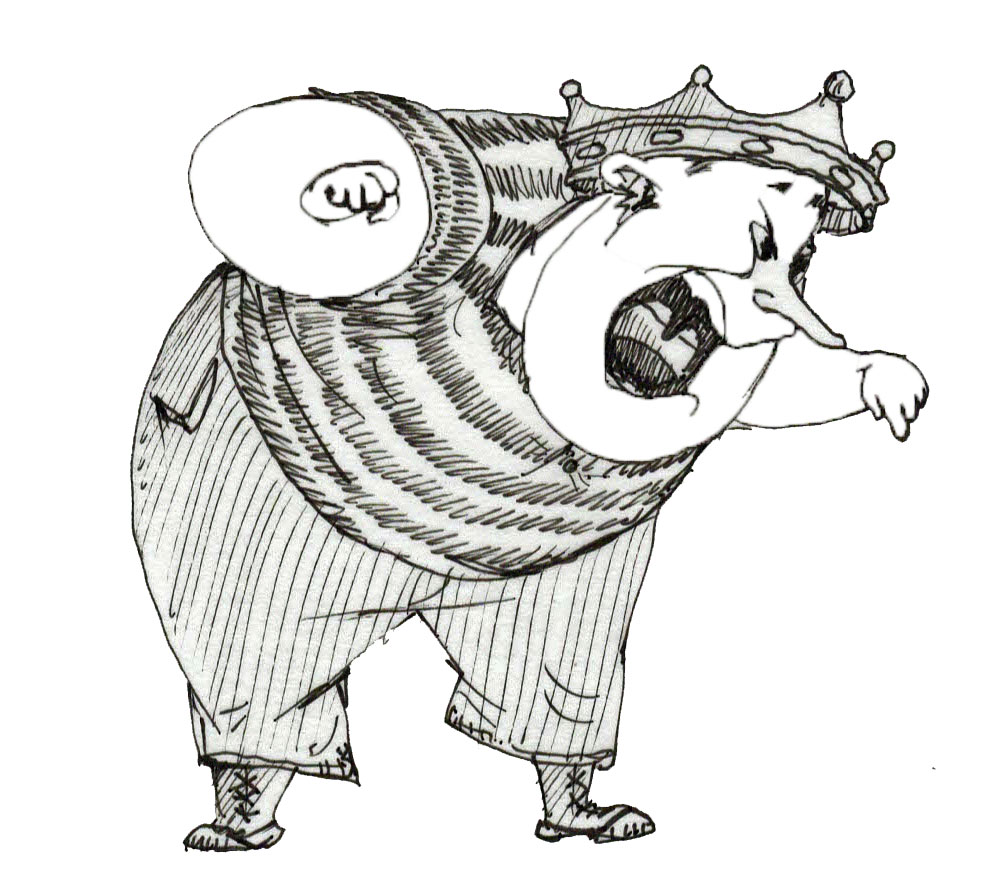 An oversized crown perched crookedly on Onus’s head, being stopped only by his ears from ending up around his neck. He wore a striped green-and-black polo shirt with a white collar, black jeans, and black high-top sneakers. He was very round and squat, and his narrow little eyes were fastened on James.
An oversized crown perched crookedly on Onus’s head, being stopped only by his ears from ending up around his neck. He wore a striped green-and-black polo shirt with a white collar, black jeans, and black high-top sneakers. He was very round and squat, and his narrow little eyes were fastened on James.
He pointed a finger and the three dirt miners snapped to attention.
“Bring them over here ’tho I can get a better look!” the king said with a very slight lisp.
“You’re just a kid, like me,” said James, smiling.
“No! You’re just a kid! I’m a king!”
“If I may say,” began Roget, “’e will be a king—”
“You be quiet! I’m not talking to you!” screamed Onus.
“—very soon,” Roget trailed off weakly.
Onus turned his attention back to James.
“What are you doing here? I only wanted the goat. Don’t tell me. He’s your scapegoat and you want him back. Ha! Not a chance.”
“Just our luck, the King of Accusia is a loud-mouthed brat,” Kiljoy muttered to himself from Roget’s pocket.
“What was that?” Onus whirled back to Roget.
Kiljoy ducked out of sight.
“Nothing! Nothing, Your Highness. Nothing at all,” Roget stammered.
“Are you calling me names?” he asked threateningly.
“I said it,” Culpa lied.
“It just slipped oo-ou-out.” King Onus turned his attention to Culpa, standing behind James and Roget. He slipped off the throne, hiked his pants up to his large midsection, and waddled down from the platform.
“’Tho it was you, huh?” Onus shoved past James and Roget to appraise Culpa. “Kinda puny, aren’t you? My last scapegoat was twice your size. You think you’re worth what I paid?” Onus flashed a wicked smile. “Let’s see how you take the blame for your friend calling me a brat. How’s this?”
He kicked Mayor Culpa hard, on his rear end, jolting the little goat.
“Stop it!” James shouted. “He didn’t do anything to you!”
“He’s a scapegoat, stupid!” said Onus. He kicked the goat again. Culpa bore it well and bleated piteously enough to satisfy the king.
“Cut it out,” James warned.
“Or what?” challenged Onus. He puffed out his chest and bumped James with his belly, taunting him.
“Bully!” James seethed through gritted teeth.
Onus came nose to nose with James.
“Shut up, you! I’m the king!”
With a malicious sneer, he shoved James so hard he fell back over Culpa onto the floor. Onus let out a cackle and a snort. The dirt miners nodded and laughed too, encouraging the royal brat.
“’Zat was not very nice,” said Roget, helping James to his feet.
Fearing that catastrophe was imminent, Kiljoy jumped from the vest pocket and made a run for it.
“Oh, no ya don’t!” one of the miners said, grabbing Kiljoy and presenting the squirming pessimist to the king. Panic made Kiljoy swell up like a small blowfish. The miner held him by his skinny arms, his legs swinging, kicking in the air.
“Calm down, calm down,” Onus said quietly. “I’m not gonna hurt you! I’m not gonna hurt anybody.”
A relieved Kiljoy immediately deflated and allowed himself to be set down on the armrest of the throne.
Delighted, King Onus grabbed an empty jelly jar from the debris piled next to his throne and scooped Kiljoy into it, clapping on the lid, trapping him like an insect. He picked up a small screwdriver and violently brought the point down on the lid. Kiljoy dodged the dangerous stabs as Onus punched several holes in it and set the jar on the arm of his throne.
“Hey look, everybody! I have a new pet!”
The three grizzled miners smiled and nodded their approval while edging closer to the door with their loot, ready to bolt.
“Take the goat to my room and tie him to my whipping post!” The three miners bowed, grabbing the bleating scapegoat, and made a rush for the door.
“Not you, Toothless!” Onus called to the last miner.
Toothless stopped at the door, his shoulders sagging. The grizzled old miner plastered an ingratiating smile on his face and slowly turned around. “Yes, your high and mightiness?”
Onus crooked a pudgy finger, summoning him forward and commanding him to stand guard over his new treasure. Then he turned his attention back to the others.
“Why did you come here?” he asked. “Never mind. I don’t have anyone to play with at the moment so you’ll stay and keep me company.”
“We can’t stay,” said James.
“I’m not asking. I’m tellin’!” the king hollered.
James spoke slowly in measured tones, holding his temper. “That’s not why we’re here.”
“Oh? Then why did you come?”
Though still fuming, James decided to give diplomacy one last chance. James continued to speak as politely as he could. “You see,” he said, “I had this idea to be the most average kid in the world and the Council of Judges in Average—”
“You think you’re going to take the place of Norman the Unexceptional? You? Don’t make me laugh.”
“Well, I’m going to try,” said James, reaching his boiling point. “But before I do that, I’m going to find King Norman’s children.”
The chubby king’s expression changed. “Those traitors!” His chin quivered and he seethed, practically snorting through his nose. “Get them out of here! Throw them in the dungeon!”
James expected several more guards to appear, but there was only the lone prospector, Toothless.
“Beg pardon,” Toothless ventured, “it’s crammed as it is—”
Onus turned purple with rage. “SHUT UP AND DO IT!!”
Toothless shook his head and obeyed. “Come with me.” He took James and Roget by their shirt collars and dragged them to the door.
“Kiljoy! My compatriot! What about my friend?” Roget asked.
“He’ths mine now,” said Onus.
They looked back at Kiljoy, standing in the jar by the throne, banging away, his tragic cries muffled by the glass.

